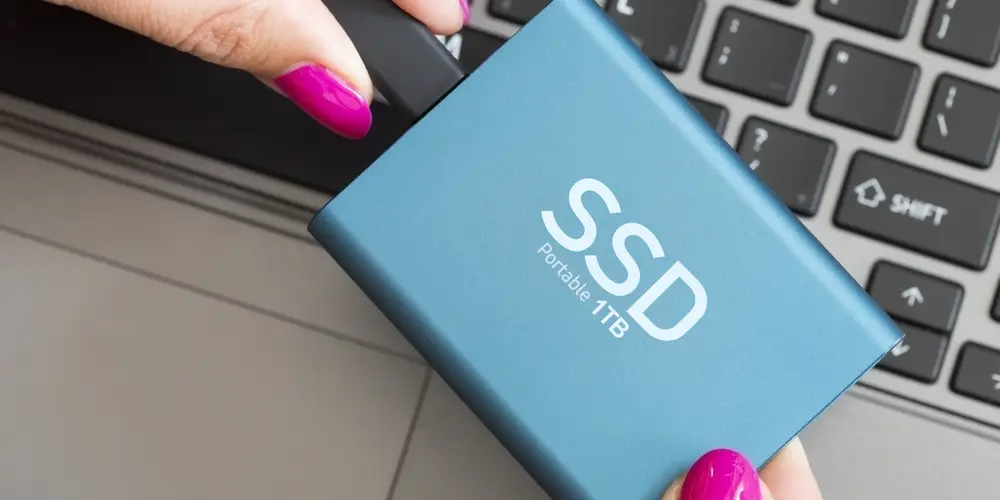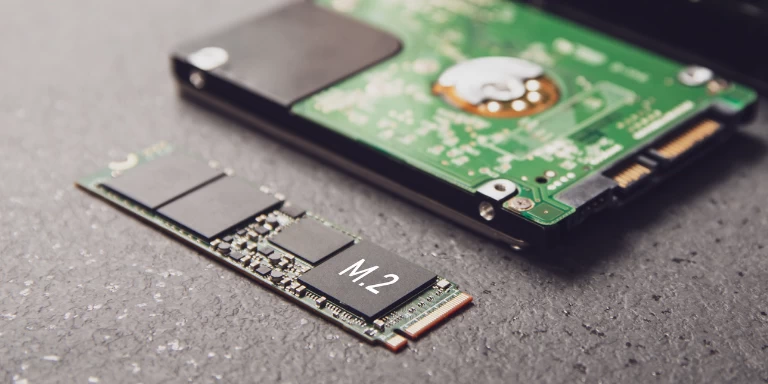In today’s digital age, laptops are indispensable tools for students. Whether it’s research, assignments, online classes, or entertainment, laptops have become central to the modern educational experience. When it comes to choosing the right laptop, one critical component often overlooked by many is storage. The type of storage drive used in a laptop can significantly impact its performance and longevity. In this comprehensive guide, we will delve into the world of solid-state drives (SSDs) and explore why they matter in student laptops.
Understanding the Basics: What is an SSD?

Before we dive into the importance of SSDs in student laptops, let’s start with the basics. A Solid-State Drive, or SSD, is a data storage device that uses NAND-based flash memory to store data persistently. Unlike traditional Hard Disk Drives (HDDs), which rely on spinning magnetic disks, SSDs have no moving parts. This fundamental difference brings about a multitude of advantages that make SSDs a game-changer in the world of laptops.
1. Speed and Performance
One of the most significant advantages of SSDs is their speed. In student laptops, where multitasking and quick access to data are crucial, SSDs shine. Here’s why speed matters:
1.1 Faster Boot Times
SSDs dramatically reduce boot times. Students don’t have to wait impatiently for their laptops to start up; they can dive into their work or studies almost instantly.
1.2 Swift Application Launches
Applications open faster with SSDs. Whether it’s your word processor for typing up an assignment or a specialized software tool for a particular course, SSDs ensure that there’s minimal lag.
1.3 Seamless Multitasking
Students often have multiple tabs open, working on assignments, researching topics, and attending online classes simultaneously. SSDs allow for smoother multitasking, with minimal slowdown when switching between tasks.
1.4 Snappy Performance for Resource-Intensive Tasks
For students pursuing creative disciplines like graphic design or video editing, SSDs are indispensable. They enable faster rendering and processing of large files, contributing to a smoother workflow.
2. Durability and Reliability
The best laptop for students is subjected to a fair amount of wear and tear. They are carried to and from classes, stuffed into backpacks, and sometimes even accidentally dropped. In this regard, SSDs offer a durability advantage over traditional HDDs.
2.1 Resistance to Physical Shock
HDDs are sensitive to physical shocks and can be damaged if the laptop is dropped or bumped. SSDs, being solid-state devices with no moving parts, are much more resistant to physical shock.
2.2 Enhanced Longevity
With no spinning disks, SSDs are less prone to mechanical failure. This means they tend to last longer, reducing the chances of unexpected data loss or hardware replacement during crucial academic periods.
3. Energy Efficiency and Battery Life
Students often find themselves working in places where power outlets are scarce, such as lecture halls, libraries, or coffee shops. In such situations, the energy efficiency of a laptop becomes vital.
3.1 Lower Power Consumption
SSDs consume less power than HDDs. This not only extends battery life but also generates less heat, keeping the laptop’s temperature in check during long study sessions.
4. Quiet Operation
The absence of moving parts in SSDs results in silent operation. Students can work on assignments or attend online lectures without the distracting noise of a spinning hard drive.
5. Portability and Weight
Student laptops are expected to be lightweight and portable. SSDs, being smaller and lighter than HDDs, contribute to a more compact and easily transportable laptop design.
6. Data Security
Data security is a paramount concern for students. Losing important assignments or research due to a storage failure can be disastrous. SSDs offer advantages in this area as well:
6.1 Reduced Data Loss Risk
The lack of moving parts in SSDs reduces the risk of data loss due to mechanical failure, making them more reliable for storing important academic work.
6.2 Encryption Options
Many SSDs come with built-in hardware encryption features, offering an additional layer of data security. This is especially important for protecting sensitive research data.
7. Future-Proofing
As technology advances, software and applications become more resource-intensive. Having an SSD in your student laptop ensures that it remains relevant and capable of handling future software updates and requirements.
8. Operating System Performance
SSDs significantly boost the performance of operating systems. Your laptop boots up faster, applications run smoother, and overall, the user experience is greatly improved.
Choosing the Right SSD for Your Student Laptop

Now that we understand the importance of SSDs in student laptops, it’s crucial to know how to choose the right one. Here are some factors to consider:
Capacity: How Much Storage Do You Need?
The first and foremost consideration when selecting an SSD is its capacity. This determines how much data, including your documents, applications, multimedia files, and software, you can store on your laptop. SSD capacities typically range from 128GB to 4TB or more.
How to Choose the Right Capacity
- Evaluate Your Storage Needs: Take stock of your current data usage and estimate your future requirements. Consider the size of your files, the number of applications you use, and whether you store large multimedia files.
- Balance Price and Capacity: Larger-capacity SSDs are more expensive. Choose a capacity that suits your needs without overpaying for excessive storage you won’t use. For most students, 256GB or 512GB should suffice.
- Consider Future Expansion: If your laptop allows for additional storage or if you anticipate your storage needs growing, it may be wise to opt for a slightly larger SSD.
SATA vs. NVMe: Which Interface Do You Need?
SSDs come in two main interface types: SATA (Serial ATA) and NVMe (Non-Volatile Memory Express). The choice between these interfaces depends on your laptop’s compatibility and your performance requirements.
SATA SSDs:
- Compatibility: SATA SSDs use the same interface as traditional HDDs, making them a drop-in replacement for laptops that originally had HDDs. This is a common choice for laptops that lack M.2 slots for NVMe SSDs.
- Performance: While SATA SSDs are significantly faster than HDDs, they are generally slower than NVMe SSDs. However, for everyday tasks and student work, the speed difference may not be very noticeable.
NVMe SSDs:
- Performance: NVMe SSDs are considerably faster than SATA SSDs, offering faster data read and write speeds. This makes them ideal for tasks that require high-speed data transfer, such as video editing or gaming.
- Compatibility: Not all laptops support NVMe SSDs, so you should check your laptop’s specifications to ensure compatibility.
How to Choose the Right Interface:
- Check Laptop Compatibility: First, determine whether your laptop supports NVMe SSDs. Consult your laptop’s manual or the manufacturer’s website for compatibility information.
- Consider Your Usage: If you’re primarily using your laptop for standard student tasks like word processing, internet browsing, and research, a SATA SSD should suffice. If you need faster data access for demanding applications, an NVMe SSD may be worth the investment.
Brand and Reliability: Choose a Trusted Manufacturer
The reliability of your SSD is critical to ensure your data’s safety and the long-term performance of your laptop. Opting for a reputable brand with a track record of reliable SSDs is a wise choice.
How to Choose a Reliable Brand:
- Research Reviews: Look for SSD reviews and comparisons from trusted sources. This will give you insight into the performance and reliability of different SSD models and brands.
- Consider Warranty: Check the warranty offered by the manufacturer. Longer warranties often indicate the manufacturer’s confidence in their product’s reliability.
- Brand Reputation: Well-known brands like Samsung, Crucial, Western Digital, Kingston, and SanDisk have earned trust in the SSD market for producing reliable and high-quality drives.
Price and Budget: Finding the Right Balance
Price is an important factor in choosing an SSD for your student laptop. SSD prices vary based on capacity and performance, so finding the right balance between your budget and your needs is key.
How to Find the Right Balance:
- Set a Budget: Determine how much you’re willing to spend on an SSD. Be realistic about what you can afford.
- Prioritize Performance: If you need a faster and best laptop for students‘ tasks like tasks or assignments, consider allocating more of your budget to get a higher-performance SSD.
- Look for Deals: Keep an eye out for discounts and promotions. SSD prices can fluctuate, and you might find a good deal on a reliable drive.
Read and Write Speeds: Assessing Performance
While SSDs are generally faster than HDDs, there can still be variations in performance among different SSD models. Two key factors to consider are sequential read and write speeds, which affect how quickly data can be accessed and saved.
How to Assess Performance:
- Check the Spec Sheet: SSDs typically list their sequential read and write speeds in product specifications. Higher speeds indicate faster performance.
- Real-World Performance: While spec sheet numbers can provide a rough idea, it’s also a good idea to look for real-world performance tests and reviews to see how an SSD performs in everyday tasks.
Conclusion
Solid-state drives have revolutionized the laptop industry and have become an essential component, especially for student laptops. Their impact on speed, durability, reliability, battery life, and data security cannot be overstated. When selecting the best laptop for students on your educational journey, prioritize laptops equipped with SSDs to ensure a smooth and productive experience throughout your academic career. Remember that investing in an SSD is an investment in your future success as a student.
In conclusion, SSDs matter for student laptops because they not only enhance performance but also contribute to a more reliable and durable computing experience. The benefits of SSDs go beyond just speed; they encompass the overall usability, longevity, and data security of the laptop. As technology continues to advance, SSDs will remain a crucial component in providing students with the tools they need to excel in their educational endeavors.

